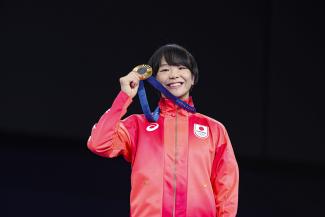Good governance at UWW: most women ITOs at Paris 2024, reserved seats in Bureau
Friday, July 12, 2024 - 04:45 By United World Wrestling Press

CORSIER-SUR-VEVEY, Switzerland (July 11) -- United World Wrestling will send its highest number of female International Technical Officers (ITOs) to Paris 2024. This marks a significant jump with 22 percent of the total wrestling ITOs for Paris 2024 begin women.
Continuing its efforts towards gender balance, UWW will send 11 ITOs to Paris, the most in wrestling history at the Olympic Games. The first female ITO in wrestling at the Olympics was back in 1988 at the Seoul Olympics.
In another significant move, UWW amended its constitution to reserve two more seats for women in the Bureau, thereby bringing the minimum number of women Bureau members to five. The number of vice presidents was also increased from the current number of five to six, including a minimum of two women vice presidents.
These steps were in line with the good governance that UWW strives for in its work. The results of the past efforts are reflected in the fifth governance report of the Association of Summer Olympic International Federations published last month.
UWW moved from Group B to Group A2 in the ASOIF report, scoring 188 points out of a maximum of 240 points and progressed since the last review, moving up one group.
The ASOIF also used UWW's example to demonstrate good ways to showcase organizational structure, allowances and benefits in finance, the conduct of elections, announcing of open positions, competition law compliance, appeal process and data protection and IT security.
UWW was one of the 32 International Federations that participated in the study which includes five sections -- transparency, integrity, democracy, development and sustainability and control mechanisms.
Each of these sections is further divided into 12 indicators and the ASOIF scores each IF based on these indicators.
The first review of IFs was conducted in 2016-17. In the latest review, all 32 IFs exceeded the target of 150 out of 240, and most saw their score on the 50 retained indicators increase by a meaningful amount.


Share your thoughts.
Comments